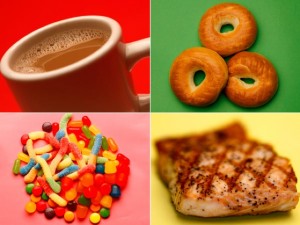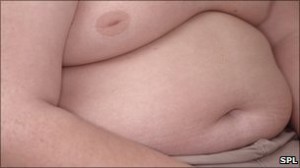You’ve heard the claims: Chocolate evokes that loving feeling. Eating fish makes you smarter. Pure carbs calm you down. If you are what you eat, as they say, then it certainly stands to reason that food can influence mood and brain power.

How does food influence mood and brain power?
The theory behind these supposed connections seems plausible. Certain neurotransmitters do affect the brain and, consequently, our dispositions in measurable ways. For instance, high levels of serotonin are associated with being calm, happy and relaxed, while low levels are linked to depression and aggression. Dopamine and norepinephrene are reward chemicals released by the brain in response to pleasure.
Particular foods have been shown to boost the production of these neurotransmitters but usually not by enough to make a perceptible difference in the brain. In fact, science has shot down most of the food-mood links accepted as conventional wisdom and perpetuated by self-proclaimed nutrition experts.
Which is a good thing. If you think about it, it’s heartening to realize that you can’t easily influence your mood by a bagel or banana.
“If food were designed to take mood way up or way down, we’d be in big trouble,” says John Fernstrom, a professor of psychiatry and pharmacology at the University of Pittsburgh School of Medicine.
Still, people have an insatiable craving to believe that eating certain things will boost mental focus, attitude or energy. And believing may just be the best shot at a food-mood connection.
“Our perceptions about food and what it will do for us are very strong and can create a self-fulfilling prophecy, even if no physiological evidence exists,” says psychologist Robin Kanarek, who directs the nutrition and behavior laboratory at Tufts University in Medford, Mass.
Although much remains to be studied, here’s what scientists currently believe to be true and false with regard to the relationship between the belly and the brain:
Sugar makes kids hyperactive.
False
We’ve heard for years that sugar gets kids all wound up at birthday parties or on Halloween, but it’s really just the excitement and unstructured environment surrounding the festivities, Kanarek says. She cites an authoritative analysis published in the Journal of the American Medical Assn. in 1995 that examined the effect of sugar on the behavior or cognition of children. Researchers crunched through the data from 16 published studies in which neither kids nor their adult observers knew who got real sugar and who got an artificial sweetener. The surprising result was that sugar had nothing to do with how the children behaved.
The fact that parents expect their kids to bounce off the walls after they eat sweets is what perpetuates the behavior, Kanarek says. Moreover, many parents don’t realize that the body can’t tell the difference between the sugar in a glass of apple juice or the sugar in a large cookie.
Coffee improves energy and mental performance.
True
This claim has been supported in numerous studies which have consistently shown that caffeine — the ingredient that gives coffee its kick — improves focus, attention, mood and energy, says psychiatrist Joseph Hibbeln, acting chief for the Section on Nutritional Neurosciences at the National Institute on Alcohol Abuse and Alcoholism. “Caffeine creates a more perfect association of ideas,” he says.
An irrational fear of caffeine addiction turns some people against coffee, says Marcia Pelchat, a food researcher at Monell Chemical Senses Center in Philadelphia. “It’s harmless because the amount people use is self limiting,” she says. “People back off when they feel jittery.”
Carbohydrate snacks make you feel calmer and happier.
False
Some nutrition experts still perpetuate the outdated theory that a high-carb snack will boost mood. The reasoning went like this: Carbohydrates boost serotonin, which makes you feel calm and relaxed, so eating carbohydrates also makes you feel calm and relaxed. The problem is that a lot happens between the mouth and the brain. For instance, if you have any protein within 12 hours of a carb snack, the protein will block the brain’s uptake of serotonin and the snack will have no effect on your mood, Fernstrom says.
In an experiment with lab rats, researchers found that for the animals to experience any serotonin boost from carbs, they had to put two to four hours between the all-carb snack and a protein meal — and their metabolism rates are about five times higher than those of humans. So if you had one slice of bacon at 8 a.m., then nothing but pure carbohydrates all day, at 8 p.m. you might feel a little boost.
Ironically, preliminary research suggests that some dietary protein — such as that from eggs — may have a bigger effect on mood than carbohydrates, Fernstrom says.
Sugar takes the edge off pain.
True (maybe)
This old wives’ tale does get some support from science, Pelchat says. Studies have shown sugar to relieve pain in infants, which is why nurses give newborns sugar water before performing a heel stick, and rabbis give baby boys sweet wine before their bris. A meta-analysis published this year in the Archives of Disease in Childhood found that just a few drops to half a teaspoon of sugar takes the sting out of immunizations for babies up to the age of 12 months.
However, a study published in September in the journal Lancet cast doubt on this widespread belief. British researchers concluded that sugar merely inhibits babies’ ability to register pain in their facial expressions; the brain activity of newborns as their heels were pricked was actually the same whether they were given sweetened or sterile water.
Any pain-relieving effect of sugar is difficult to demonstrate in adults because they have more complex palates, Pelchat says.
Chocolate brings good feelings.
False (almost)
Whatever mood boost chocolate gives you is all in your head, and that’s OK, says Pelchat, who has been researching the relationship between chocolate and mood for nearly 20 years.
Chocolate contains many components with the potential to enhance mood, but the chemical effect of each of them is small. “It does have low levels of stimulants, but you can get a lot more from other substances,” she says. “The caffeine content is very low, so coffee is better for that kind of kick. The sugar might give a temporary lift, but it’s subtle. And the phenylethylamine that people say is supposed to make you feel in love — well, many foods, including salami, are much higher in phenylethylamine.”
In North America and parts of Europe, women tend to crave chocolate around their menstrual periods, but in other countries, women crave black licorice. To Pelchat, that suggests that “chocolate is more of a cultural phenomenon than a physical one.”
The other reason it may lift mood is because it’s really delicious. “Anything we find delicious is part of a system that triggers the reward cascade in our brains,” she says. “But what causes that cascade for one person doesn’t necessarily do it for another.”
Turkey makes you sleepy
False
People have often heard that foods rich in tryptophan — an amino acid plentiful in turkey and milk — will make them sleepy because it has a calming effect on the brain. But each molecule of tryptophan has to compete with many other amino acids to get into the brain, says Elizabeth Somer, a registered dietitian and author of “Eat Your Way to Happiness.” A Thanksgiving feast will make you groggy, but tryptophan isn’t the reason.
“Eating any big meal, especially if you also drink alcohol, is likely to make you feel sleepy,” Kanarek says.
Omega 3 fatty acids found in fish help depression.
True
At the NIH, Hibbeln has spent two decades studying the effects of omega-3 fatty acids on depression and other mood disorders. The evidence that eating fish high in omega-3s can help is strong, he says.
“These nutrients are as effective as antidepressants in treating people with clinical depression,” Hibbeln says. In fact, the American Psychiatric Assn. recommends that people with major depression consume a daily omega-3 supplement.
However, some nutritionists have gotten carried away by assuming that omega-3s can boost the spirits of people who are feeling just a little down. “When we give antidepressants to people who are a little blue, we see that placebos have an almost equal response,” Hibbeln says.
For those with clinical depression, the recommended dose is three 6-ounce servings of salmon, tuna, herring or sardines each week. Mussels and trout are also good, but less so. If you can’t stomach that much fish, take the equivalent in pure fish oil that contains DHA and EPA. Expect effects within a month, Hibbeln says.
Conversely, eating foods that inhibit omega-3s can make people feel worse. These include alcohol and foods high in omega-6 fatty acids, such as corn, vegetable and soy bean oils as well as the hydrogenated fats found in processed foods. Olive oil and saturated fats, such as butter, are considered neutral.
What you eat for lunch causes that 3 o’clock slump.
False
People often blame their lunch for making them feel lethargic in the afternoon. However, your reduced performance probably has more to do with your circadian rhythm than your diet, Kanarek says. A small snack at 3 p.m. can help get you through, but it’s best to avoid simple carbs and sugar; Kanarek recommends an apple and some cheese.
If you’re feeling cranky, drink water.
True
One of the first signs of dehydration is fatigue, which goes along with depression, Somer says. So tank up before you get dry.
Kristen E. D’Anci, a researcher specializing in nutrition and behavior at Tufts, found that even low levels of dehydration consistently had a negative effect on mood. “Not enough water made people feel irritable, less energetic and often brought on a mild headache,” she says. She and her colleagues recommend people drink 2 liters of liquids per day — or more for those who engage in vigorous exercise or live in hot climates. Water is good, but almost any liquid, including caffeinated beverages, will do. Alcohol doesn’t count.
Nevertheless, remember that proper nutrition, not what foods can lift your spirits or energy, is what is truly important for a healthy living, which, in the long run, will be responsible for overall increased self-esteem and happiness. A custom meal plan made to reach your specific fitness goals is a good way to start!








